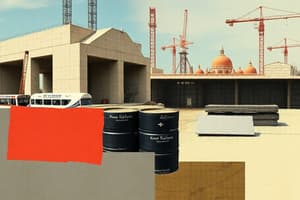Podcast
Questions and Answers
What is one of the main reasons reinforced concrete is used in large structures like dams and skyscrapers?
What is one of the main reasons reinforced concrete is used in large structures like dams and skyscrapers?
- High compressive strength (correct)
- High tensile strength
- Resistance to weathering
- Durability against heavy loads
Which property of reinforced concrete contributes to its resistance against cracking under stress?
Which property of reinforced concrete contributes to its resistance against cracking under stress?
- Sustainability
- Strength (correct)
- Versatility
- Durability
How does reinforced concrete resist impacts from heavy loads?
How does reinforced concrete resist impacts from heavy loads?
- Versatile forms
- High compressive strength (correct)
- High tensile strength
- Durability against chemicals
Which aspect of reinforced concrete allows it to be poured in place or cast in larger forms?
Which aspect of reinforced concrete allows it to be poured in place or cast in larger forms?
What percentage of global CO₂ emissions is accounted for by concrete production?
What percentage of global CO₂ emissions is accounted for by concrete production?
In terms of environmental impact, which practice has been implemented to reduce CO₂ emissions from concrete production without compromising quality?
In terms of environmental impact, which practice has been implemented to reduce CO₂ emissions from concrete production without compromising quality?
What are the primary structural components where reinforced concrete is commonly used?
What are the primary structural components where reinforced concrete is commonly used?
Why are concrete pavements preferred for airport runways?
Why are concrete pavements preferred for airport runways?
In which civil engineering aspect can reinforced concrete be commonly found apart from structural components?
In which civil engineering aspect can reinforced concrete be commonly found apart from structural components?
What is the main reason behind choosing reinforced concrete for structural components in civil engineering?
What is the main reason behind choosing reinforced concrete for structural components in civil engineering?
Why do concrete pavements offer excellent resistance to wear and tear compared to other materials?
Why do concrete pavements offer excellent resistance to wear and tear compared to other materials?
What role does reinforced concrete play in civil engineering according to the text?
What role does reinforced concrete play in civil engineering according to the text?
Flashcards
Reinforced Concrete
Reinforced Concrete
A composite material combining concrete and steel for enhanced strength and durability.
Compressive Strength
Compressive Strength
The ability of a material to withstand axial loads without failure, crucial for large structures.
Tensile Strength
Tensile Strength
The resistance of a material to being pulled apart, significant in reinforced concrete.
Durability of Concrete
Durability of Concrete
Signup and view all the flashcards
Versatility in Applications
Versatility in Applications
Signup and view all the flashcards
Sustainable Practices
Sustainable Practices
Signup and view all the flashcards
Structural Components
Structural Components
Signup and view all the flashcards
Pavements
Pavements
Signup and view all the flashcards
Runways
Runways
Signup and view all the flashcards
Drainage Systems
Drainage Systems
Signup and view all the flashcards
High Load Capacity
High Load Capacity
Signup and view all the flashcards
Concrete Emissions
Concrete Emissions
Signup and view all the flashcards
Study Notes
Reinforced Concrete in Civil Engineering
Reinforced concrete is one of the most widely used materials for construction projects due to its strength and versatility. This section will delve into the properties and applications of reinforced concrete, with a focus on their significance in civil engineering.
Properties of Reinforced Concrete
Strength
Reinforced concrete has high compressive strength, which makes it suitable for large structures like dams and skyscrapers. When combined with steel reinforcement, this material also gains tensile strength, making it resistant to cracking under stress.
Durability
The durability of reinforced concrete is another reason why it's commonly used in construction. It can resist weathering, corrosion from chemicals, and impacts from heavy loads.
Versatility
Reinforced concrete can take various forms - it can be poured in place, precast, or cast in larger forms. These factors contribute to its widespread application across diverse industries requiring infrastructure development.
Sustainability
In terms of environmental impact, concrete production accounts for approximately 8% of global CO₂ emissions. However, advances in sustainable practices such as fly ash or blast furnace slag usage have been implemented to reduce these emissions without compromising quality.
Applications of Reinforced Concrete in Civil Engineering
Structural Components
Reinforced concrete is primarily used for structural components like beams, columns, slabs, and walls due to its strength and durability. These elements form the backbone of buildings, bridges, and other civil engineering projects.
Pavements & Runways
Concrete pavements offer excellent resistance to wear and tear compared to other materials like bituminous mixtures. They are commonly used for airport runways due to their high load capacity and long service life.
Drainage Systems
Reinforced concrete can also be found in drainage systems such as culverts and storm water pipelines. Its strength ensures safety even under extreme pressure conditions.
In conclusion, reinforced concrete plays a crucial role in various aspects of civil engineering due to its inherent properties and versatile applications. As construction techniques continue to evolve, so too will the potential uses for this durable and reliable material.
Studying That Suits You
Use AI to generate personalized quizzes and flashcards to suit your learning preferences.




